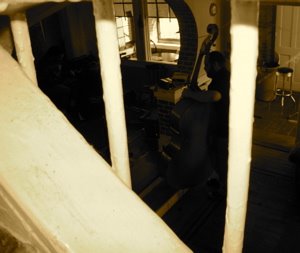You may want to start here and then go here.
Enough has been written about how absolutely brilliant (i.e. production techniques or the "Wall of Sound") and how utterly bonkers (i.e. assault, murder charges, wigs, etc.) Phil Spector is, so I don't need to say too much. But, for me, Spector is iconic, if not archetypal, in terms of pop music (Think of how important producers are in pop music today, like Timbaland, for example).
"Be My Baby" has that great drum beat in the intro also heard in the guitar intro here (bass-bassdrum--snare). I haven't quite figured out how or why this rhythm screams pop music to me. Is it that it's unquestionably danceable? That it's more primal, especially when it's generally played with all drums and no cymbals? Does it put focus on the "body" (three low bass beats) and less on the "mind" (one high, sharp snare crack) like pop music, in general, does? Pop music's catchiness and tendency to induce butt-shaking cause some people to revolt against it as a "lower" form of music, but it doesn't have to be and often isn't. I may just be digging a bigger hole for myself here...
The Ronettes are a great example of that pop music staple--a band created by producers: the girl group, aka the boy band, aka the Monkees, New Kids, Spice Girls, etc.
Check out how Brian Wilson, known to obsess about Phil Spector, takes "Be My Baby" and makes it "Don't Worry Baby." You get that same rhythm I mentioned earlier. The Boys look stiff and uncomfortable, but what an amazing song. Wilson used many of Spector's session musicians, as well. I'm pretty sure Glen Campbell plays guitar here (that staccato/ rhythm part?) and there's a possibility that Hal Blaine (drums) and Carol Kaye (bass and/or guitar) played on both of these songs, too.
I never have been and will never be a singer, but I remember attempting to learn each voice part of this song and listening to it over and over and over again.
Bass geek talk:
From what I've read, part of Spector's Wall of Sound came from how he recorded bass parts. He used three bass players! One played upright, one played the Fender bass (electric bass), and one musician picked on a "six-string bass guitar." I'm thinking this last one was something like a baritone guitar. Supposedly, Carol Kaye had been playing guitar, but then moved to bass and played it with a pick. By doing this, she kind of eliminated the need for that third player. Brian Wilson mostly used Kaye and an upright player, from what I know.
I listened to some bass parts on some Howlin' Wolf and Willie Dixon records and was just blown away by the sound of them. Willie Dixon wrote and played bass on many of these songs, but I couldn't figure out how he got certain sounds. What I remember finding out was that he would often play a line on upright and overdub an electric line on top of that. Anyway, it's a cool sound and even though the idea is the same as the Spector/Wilson approach, Dixon makes it his own. I've been meaning to experiment with this technique at home, but haven't yet.
Subscribe to:
Post Comments (Atom)

3 comments:
I guess I'll just comment here instead of adding anything to that post.
But why do I even hear anything in that rhythm? Going back and listening again it's just a variation on a typical 4/4 beat used in thousands of songs (1, 2, and 3, 4) or (bass, snare, bassdrum, snare). The Spector version leaves out the two to create tension in the verse of "Be My Baby," but fills it in in the chorus for drive. Wilson doesn't use the "missing two" at all. I'm just focused on the bassline which doesn't have the two or four. Wow, I've listened to these songs so much and I would have bet money that "Don't Worry" had the "Be My" beat.
Oh well. The "missing two" screams pop music to me.
Tic-tac bass, tuned an octave lower than guitar. Danelectro was the brand of choice in the 60s. Now, Jerry Jones.
http://www.jerryjonesguitars.com/NLHbass6.htm
Ah, I've heard that term before, but I thought it referred to the sound and not a particular, nice-looking instrument used to help get that sound. Cool.
Thanks.
Post a Comment